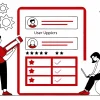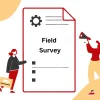
How to Maintain Confidentiality and Security in Feedback System: Best Practices
In today’s digital landscape, feedback systems are essential for organizations to gather valuable insights and improve their operations. These systems facilitate clear communication with employees, customers, and stakeholders.
However, to function effectively, it’s crucial to ensure security in feedback systems to protect sensitive information. This article explores the best practices for maintaining confidentiality and security, fostering trust, and safeguarding data.
Importance of Confidentiality in Feedback System
Confidentiality is a cornerstone of effective security in feedback systems. It encourages honest communication by assuring individuals that their feedback will remain private.
Without this assurance, trust can erode, leading to reduced willingness to share valuable insights and potentially harming the organization’s reputation or causing legal issues.
1. Why Confidentiality Matters?
When feedback is confidential, employees are more likely to share their genuine thoughts without fear of repercussions. This transparency enables leadership to understand real issues and make informed decisions.
Ensuring security in feedback systems creates an environment where openness leads to meaningful changes and a stronger organizational culture.
2. Risks of Compromised Confidentiality
A breach in security in feedback systems can have severe consequences. Employees might withhold critical feedback or provide superficial responses, preventing leaders from addressing significant issues and stalling growth.
Unauthorized disclosure of sensitive information can also lead to legal troubles and damage the organization’s reputation.
To maintain the effectiveness of feedback systems, companies must implement robust security measures and clear policies. Protecting confidentiality is essential for building trust and facilitating continuous improvement.
Implementing Robust Access Controls
One of the key components of security in feedback systems is effective access control. This involves using strong authentication processes, permission settings, and detailed logging to prevent unauthorized access.
These measures ensure that only authorized personnel can view, modify, or delete feedback data.
1. Securing Feedback Data: Key Considerations
To enhance security in feedback systems, consider the following best practices:
- Use strong authentication methods, such as multi-factor authentication, to verify the identities of individuals accessing the system.
- Implement role-based access controls (RBAC) to grant permissions based on the user’s role and the principle of least privilege.
- Regularly review and update access rights to reflect changes in job responsibilities and organizational structure.
- Maintain comprehensive logs and monitoring to track all activities within the feedback system.
- Establish clear procedures for granting and revoking access to the feedback system.
By following these practices, organizations can strengthen security in feedback systems, protecting the sensitive information provided by employees and stakeholders.
Secure Data Storage and Transmission
Ensuring the secure storage and transmission of data is crucial for maintaining security in feedback systems. Organizations must employ robust encryption techniques and secure transmission protocols to safeguard the information collected through these systems.
1. Encryption Methods
Encryption is a vital aspect of security in feedback systems. Advanced algorithms like AES (Advanced Encryption Standard) and RSA (Rivest-Shamir-Adleman) help protect data by making it unreadable to unauthorized individuals.
2. Secure Data Transfer Protocols
Securely transmitting feedback data between systems and users is also critical. Protocols such as HTTPS (Hypertext Transfer Protocol Secure) and SFTP (Secure File Transfer Protocol) encrypt data during transit, preventing interception and tampering.
By implementing strong encryption and secure transmission methods, organizations can mitigate the risks associated with data breaches and ensure the confidentiality and integrity of feedback data.
Maintaining Security in Feedback Systems
Maintaining robust security in feedback systems is essential for a reliable data collection process. Organizations should adhere to best practices and continuously update their security measures to protect sensitive information and prevent data breaches.
1. Regular Security Audits and Monitoring
Regular security audits and monitoring are crucial for ensuring security in feedback systems. These activities help identify vulnerabilities, ensure compliance with security standards, and allow organizations to respond quickly to any suspicious activities or data breaches.
- Regularly review and update security protocols.
- Conduct thorough security audits to identify and address vulnerabilities.
- Monitor for suspicious activities or potential data breaches.
- Implement robust access controls and user permissions.
- Ensure secure data storage and transmission methods.
Proactive management of security in feedback systems helps protect sensitive feedback data and maintains trust with employees, customers, and stakeholders.
Role-Based Access and Permissions
Implementing a robust role-based access control (RBAC) system is a key strategy for maintaining security in feedback systems.
RBAC involves defining user roles and assigning permissions based on these roles, ensuring that users only access the information they need.
1. Defining User Roles
The first step in RBAC is to define the different roles within the feedback system, such as administrators, managers, and employees. Each role should have specific responsibilities and access levels.
2. Setting Appropriate Permissions
Once roles are defined, assign appropriate permissions to each role. This includes limiting access to sensitive data, controlling who can modify system settings, and determining who can download feedback reports.
By carefully defining roles and setting permissions, organizations can minimize the risk of unauthorized access and maintain robust security in feedback systems.
Conclusion
Maintaining security in feedback systems is essential for building trust and ensuring the confidentiality of sensitive information. By implementing strong access controls, secure data storage and transmission methods, and role-based permissions.
Organizations can effectively protect feedback data. Regular security audits and ongoing monitoring are also critical for identifying and addressing potential vulnerabilities.
Prioritizing security in feedback systems safeguards sensitive information and fosters a culture of openness and continuous improvement.
When individuals are confident that their feedback will remain confidential, they are more likely to share honest insights, leading to better decision-making and organizational growth.
Frequently Asked Questions
What are the best practices for maintaining security in feedback systems?
Best practices include using strong access controls, secure data storage and transmission methods, implementing role-based permissions, and conducting regular security audits and monitoring.
Why is confidentiality important in feedback systems?
Confidentiality is crucial as it encourages honest feedback. When individuals trust that their input will remain private, they are more likely to share openly. Breaches in confidentiality can erode trust and reduce participation.
How can organizations implement effective access controls for their feedback systems?
Organizations can implement effective access controls by using strong authentication methods, defining user roles, setting appropriate permissions, and maintaining detailed logs of system activities.
What measures can organizations take to ensure the secure storage and transmission of feedback data?
Organizations should use robust encryption methods, such as AES or RSA, and secure transmission protocols like HTTPS or SFTP to protect feedback data during storage and transmission.
How can organizations maintain ongoing security in their feedback systems?
Ongoing security can be maintained by conducting regular security audits, monitoring for suspicious activities, updating security protocols, and educating users about security best practices.
Enhance Patient Care and NABH Compliance with LazyMonkey
LazyMonkey is your all-in-one solution for improving patient care, retaining more patients, and meeting NABH standards. Our powerful QR-based feedback tool enables you to capture real-time insights from patient feedback, discharge surveys, staff and doctor evaluations, and clinical research, while also streamlining inter-departmental communication.
Transform your healthcare facility today - reach out to us at hello@lazymonkey.in, or request a demo here!
Elevate Your Restaurant Experience with LazyMonkey
LazyMonkey’s QR-based feedback system helps you gather real-time insights from customers, track satisfaction levels, and enhance the dining experience. Get instant feedback on your menu, service, and ambience, and make data-driven improvements to boost repeat customers and reviews.
Improve your restaurant today – reach out to us at hello@lazymonkey.in, or request a demo here!
Empower Student Engagement and Campus Improvement with LazyMonkey
LazyMonkey offers a seamless way to gather student feedback, track satisfaction, and enhance campus life. From course evaluations to dorm feedback, our QR-based solution makes it easy to capture valuable insights and improve student retention.
Upgrade your university experience – contact us at hello@lazymonkey.in, or request a demo here!
Streamline Feedback and Drive Performance Across Your Enterprise/Franchise with LazyMonkey
Whether you manage one or multiple locations, LazyMonkey’s QR-based feedback system helps you gather real-time employee and customer feedback. Improve operational efficiency, track satisfaction, and make data-driven decisions to enhance brand consistency and growth.
Transform your franchise today – reach out to us at hello@lazymonkey.in, or request a demo here!
Enhance Customer Satisfaction and Service Standards in Banking with LazyMonkey
LazyMonkey empowers banks to capture real-time feedback from clients across branches. Improve customer experience, assess service quality, and ensure regulatory compliance with our QR-based solution, helping you retain clients and meet banking standards.
Elevate your bank’s customer care – contact us at hello@lazymonkey.in, or request a demo here!
Boost Customer Engagement and Mall Satisfaction with LazyMonkey
LazyMonkey’s QR-based feedback tool enables you to collect feedback from shoppers, track satisfaction, and enhance the mall experience. Gather insights on store services, cleanliness, and entertainment to create an unmatched customer journey.














